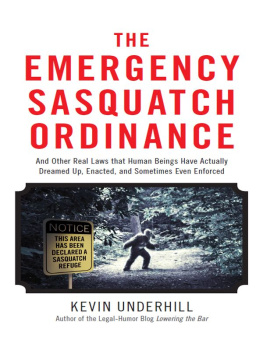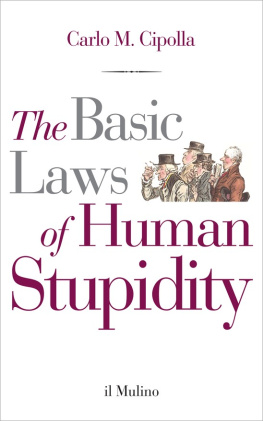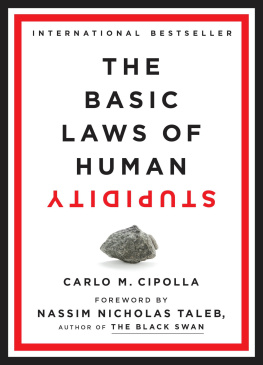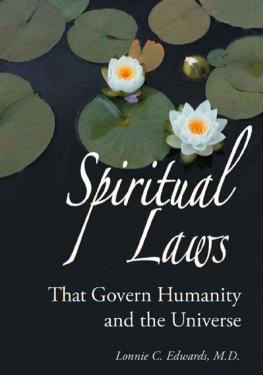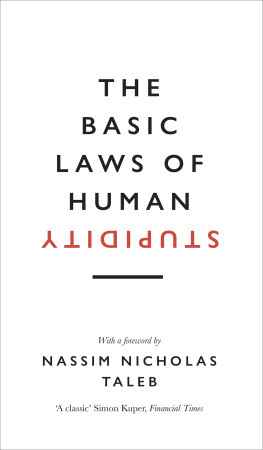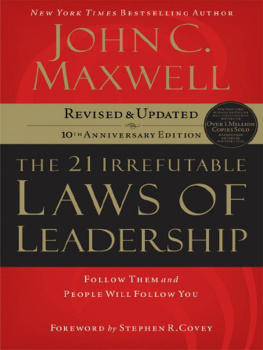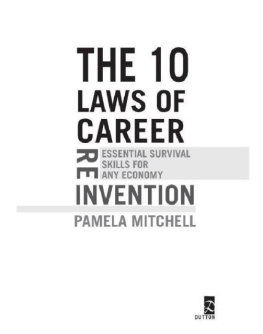Introduction and Disclaimer
Throughout recorded history, human beings have created written laws in order to define the rights and obligations of those living within a particular society with regard to each other and to members of other societies, as well as to lesser creatures and other facets of the physical world. Any given set of laws reflects not only the unique rules and customs of the particular society in which it was created, but also certain relationships and ideas that are common in one way or another to all human beings.
And just like human beings, they are sometimes weird and stupid.
In this book, you will find a collection of written laws. Strange as it will seem at times, each one was actually thought up by one or more real human beings who then, in most cases, decided after writing it down and upon further reflection that, yes, this would be a good rule that everybody should follow from now on. Many of these rules turned out to be dumb.
It is possible that in some cases, a law only seems dumb because we are so far removed from that societys cultural context, but often I think we can have some confidence that it was pretty dumb to begin with. In some cases, the law itself may make some sense but only because human beings are dumb, or at least strange. In a few cases, the law is in this book just because I thought it was funny. Thats the kind of thing you get to do when you write a book: decide what goes in it. And in two cases, the person responsible for the law was actually trying to be funny when he wrote it. Or maybe all these people were trying, but only two succeeded. Hard to say.
Laws dont have to be in writing, of course, which is good because for a long time nobody knew how to write. There were (and still are) unwritten laws, of course. For example, the first law ever was probably some unwritten version of thou shalt not kill. (The second was except for Neanderthals.) But obviously we dont have evidence today of laws they didnt write down. The ancient Egyptians could write, but they wrote mostly on papyrus, which doesnt last very long and so none of their law codes have survived. Therefore, although the Egyptians probably had some pretty weird lawsremember, these were people who would pull your brain out through your nose, wrap you in bandages, and bury you under a mountain, and that was if they liked youthey will appear only in this introduction.
The book therefore begins with the laws of ancient Sumeria and Babylon. The Sumerians and Babylonians were basically contemporaries of the Egyptians, but unlike the Egyptians, they generally wrote on tablets of baked clay or on various stone things. Their law clerks probably died young, but on the plus side, what they wrote was more or less fossilized for us to make fun of thousands of years later. So it all evens out.
We then move on to the laws of the Hittites, who were quite strange, and those of the ancient Greeks and Romans, as well as a few examples from medieval times.
Note that all the ancient laws discussed here are of course translations from languages other than English. Translations can vary a lot, and when there was a choice I picked the translation I thought was funnier. Thats because this book is for entertainment purposes. If you are looking for something with greater intellectual heft, you might want to put this book down, adjust your monocle, and head over to a more highbrow section of the bookstore, Professor Brainiac. How about something on particle physics or maybe existential Serbian drama? Ooh, I know, how about Film Studies? Hey, look at me, everyone, Im browsing through scholarly works on French cinema of the 1940s! Its for my paper relating it to Eisenstein and the avant-garde movement during the Weimar Republic! Ooooh!
Sorry. I didnt get into film school.
Most of the book is composed of laws that have been inflicted on the population of the United States. This is solely because that is the country in which I live and in which I am, probably due to some clerical error, actually licensed to practice law. Note that not all 50 states are represented in this book, but that is only because of time constraints, not because any states have laws that all make perfect sense. So quit looking all smug, Vermont.
The book then concludes with a selection of modern(ish) laws from other countries, some of which have a legal system similar to that of the United States (the United Kingdom, Australia, New Zealand, and so on), some of which have a completely different tradition (Germany, China, Papua New Guinea), and some of which can barely be said to observe the rule of law at all (Canada). Some of those laws are also available to me only in translation, and for that reason and others, you are cautioned that as to the international section in particular I could fairly be accused of winging it.
Which leads to an important point, perhaps the most important one in this entire book: Nothing in this book should be acted upon or considered legal advice . Im not too worried about you following my interpretation of the Code of Hammurabi (although please dont), but this book does discuss many laws that are currently in force (at the time of writing) and I often interpret them or give my opinions about them. You should remember that although I usually do know what Im talking about, Im also a lawyer and so I am trained to sound like I know what Im talking about even when I dont. So, for example, if you decide to take home a 20-foot whale you found in Scotland without offering it to the Queen first, or to follow my suggestions about how to avoid joining a posse in South Carolina, you do so at your own risk.
Finally, although this will seem impossible, all of the laws mentioned in this book are (or were) real. (In a few cases the law was proposed but not enacted, but if I didnt make exceptions for those, then I could not have included, for example, the New Mexico Expert Wizard Bill of 1995, and that would have been a tragedy.) That distinguishes this book from most of the other dumb laws books and websites you might come across, which often repeat what are basically urban legends. My personal feeling is that if it isnt true, it cannot be truly dumb.
With that explanation (and legally binding disclaimer ), please enjoy this book. Thats assuming this copy already belongs to you. If it doesnt, at this point you really should buy it or put it back where you found it. Or, if you have been reading this over someones shoulder, now would be a good time to start pretending to do something else before this person turns around.
Too late.
Kevin Underhill
The first written law code we know about mentions beer.
We dont actually have a copy of the laws enacted by Urukagina, who ruled the Sumerian city-state of Lagash over 4,000 years ago. But we know they existed because later sources refer to them, and Urukagina himself referred to them in what is called the Reform Edict, in which he reminded everybody how bad things had been before he came along, and how much better they got once he took charge.
If you are thinking that politicians always say that kind of thing, you are correct. This is our first piece of evidence that people havent really changed all that much over the centuries, and so accordingly we will see a number of common themes and topics recurring in this survey.
Example: For more than 40 centuries now, human beings have enjoyed getting drunk. That makes beer valuable and (if you havent invented money yet) useful for bartering. Urukagina wanted to make sure people remembered how much more expensive things were before his reforms. Back in the day, the Reform Edict says, it was super-expensive just to have someone buried:

